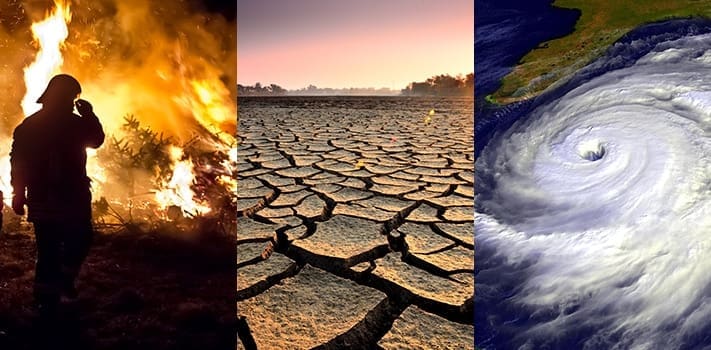The renowned World Economic Forum’s (WEF) 2020 Risk Report featured all of the Top-5 global risks as being climate-related risks. These included: Extreme Weather, Climate Action Failure, Natural Disasters, Biodiversity Loss and Human-Made Environmental Disasters.
At this time of pandemic crisis, we must reiterate the significance of climate risk, and that we need not look far enough to remember the many acute examples of climate risks materialising.
The wildfire disaster devastation on all continents except Antarctica in the past several years comes to mind, with the Knysna Fires, South Africa’s single largest ever environmental disaster economically being a particular local case in point.
Should an acute climate disaster strike in these pandemic times, the pressure on our human and economic resources would be compounded, and even more incomprehensible.
That is another lesson of the WEF Risk Report – the interconnected nature of risks, as well as the fact that “big loss events” or “long-tail events” as they are called are becoming more frequent, and more devastating.
As an aside, the risk of pandemics also featured in the Top-10 high-impact risks in the WEF 2020 Risk Report.
It has been in the report for years, highlighted in special focus sections, and in 2015 it was the second-highest impact risk, based on the events of the time.
Many may consider COVID-19 to be a Black Swan, but the WEF reports and other sources clearly indicate to us that the risk of pandemics has certainly been on the radar for a long time.

We have had a number of “preview” experiences in the past years with SARS, MERS, Ebola etc. and thus this is a “known unknown”, sometimes referred to as a grey elephant or even a grey rhino, utilising an African wildlife motif.
For those interested in déjà vu moments, the 1918 Spanish Flu pandemic is a precursor. John Barry’s classic book on this catastrophic scourge comes highly recommended, whereby 2020 is a 100-year pandemic flashback all over again, with one of the few differences this time around being the Internet.
We would do well to remember that when rating, assessing or evaluating risks and planning scenarios, we should always consider the worst-case possible scenario of raw or untreated risk (imaginable or even unimaginable) as a starting point.
The main lesson, however, to draw everyone’s attention back to, is that climate risk is a slow (but accelerating) creep, like the analogy of the frog in hot water that doesn’t notice the temperature headed to boiling point.
Similar to COVID-19, many seem to have such divergent and fervent opinions of climate risks. While we may not be headed for immediate boiling, we are certainly raising the temperature of our planet and our carbon emissions in an unprecedented way.
Just like we weren’t prepared enough for COVID-19 despite all the warning signs (some being more prepared than others), we are not sensing the gravity, not preparing enough as a collective for climate risk, and not increasing our resilience.
The insurance sector is one of the first sectors that has had to react directly to climate risk – fight or flight. Another IRMSA Risk Chat featured Environmental Social and Governance (ESG) reporting and what it means, but basically there are three factors impacting the insurance sector with regards to climate risk, and two of them have to do with ESG.
The more apparent risk is that insuring assets threatened by climate risks e.g. properties by fire, flooding etc. is becoming less predictable and not financially viable as “big loss events” or “long-tail events” become more frequent and more severe.
There is something called the Risk Protection Gap (RPG) which represents those assets that are not protected (primarily not insured) against risks which are growing, also in part as a result of assets becoming non-insurable due to climate risks, all this to the detriment of global society and often the most vulnerable (another catastrophic slow boil).
Drawing attention back to the Knysna Fires that presented us with not only South Africa’s largest environmental disaster in terms of economic impact, but the several billions of Rands of damage were mostly insured.
This motivated the insurance sector to promote risk treatment and risk resilience going forward to be able to cover similar assets – if these can ever be covered at all again in terms of rising premiums and limited/no insurance possibilities. In terms of ESG, both insuring and holding of “dirty assets” is no longer acceptable to clients, shareholders and other stakeholders.
Besides lawsuits and reputational damage, the first clients have completely declined to contract insurers covering coal, oil and gas manufacturers, and the assets themselves, shares in US Dollars tens of trillions worth of companies, many of them “dirty”, may significantly reduce in value and become “stranded” over the coming years, for example, as we shift to renewable forms of energy.
Renewables represent an excellent opportunity to increase resilience to climate risk. So, whilst there is some change, growing awareness of climate risk, industry disruptions and a shift to a low carbon economy, these are occurring at a pace that is just too slow.
Prof Bent Flyvbjerg of Oxford University in a recent posting reiterated that when it comes to the “tail end” of risk, the most unlikely events, we just don’t know the limit of possible outcomes. The COVID-19 pandemic has shown us this – almost unimaginable outcomes of a “known unknown”.
He went on to say that; “Many have rightly observed that COVID-19 may end up being a mere dress rehearsal for the biggest and most urgent tail risk we face today: climate change. If climate science is right – and there is no reason to think it is not – the law of regression to the tail will be particularly pertinent here.
It tells us that massive loss of life and wealth will likely follow if climate change is not treated now, at speed, and at an unprecedented scale, with no time to waste in each step involved.”
In other words, if the unknown outcomes of a relatively known risk event like COVID-19 have been treated in the way they were globally and can have these devastating consequences as we are seeing today, imagine how these outcomes might be for climate risk scenarios that are unprecedented for our planet.
The economic or wealth outcome referred to is important – financial planning and financial resilience are one of the biggest factors of overall resilience, that is why we save for a rainy day (or not).
Looking for an upside, anecdotally, COVID-19 has been good for climate risk. People talk about the great weather we’ve been experiencing late (coincidence?), satellite pollution maps of South Africa and most other countries clearing up, birds everywhere and dolphins swimming in the canals of Venice (fake news, sorry).
Every risk has its opportunity, for example solving our energy needs now in a more sustainable and resilient way through renewables. Why build an expensive, vulnerable power plant when a distributed power array will solve our needs?
Do we really need to travel and choke our way through smog and peak hour traffic to every meeting?
Hopefully, we learn these lessons, but as risk managers, we must go further, take up the baton and imagine the unimaginable consequences in the big picture.
Ultimately, the current crisis should elevate the strategic importance of the risk management function and the influence it has.
We should take advantage of the opportunity this crisis offers – exploiting the valuable lessons learned from the COVID-19 pandemic and improving our resilience for the next crisis.
- Dr Arthur Linke is a Member of the IRMSA Risk Intelligence Committee
